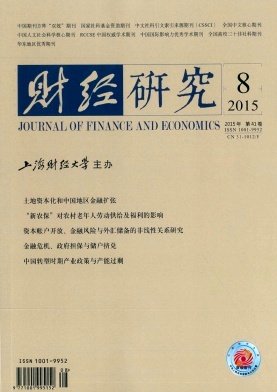能源回弹效应的理论演进与经验证据:一个文献述评
财经研究 2015 年 第 41 卷第 08 期, 页码:
摘要
参考文献
摘要
文章基于能源回弹效应相关研究文献的发展脉络与逻辑关系,从能源回弹效应的提出与界定、理论机制、经验证据和限制政策四个层面,对国内外有关能源回弹效应的理论演进与经验证据的研究成果进行了系统的梳理与总结。研究发现:(1)从研究框架看,新古典增长理论与新古典微观经济学理论这两类研究,在各自所拓展的研究方向上正殊途同归于对宏观经济层面回弹效应的探究;(2)现有研究尤其是理论研究的主要局限是,未能对能源效率的内生化处理予以足够的重视,这在很大程度上限制了其对理论和现实的解释力;(3)对回弹效应的有效限制必须通过多管齐下的政策组合措施才有可能实现。
[1]冯烽,叶阿忠. 技术溢出视角下技术进步对能源消费的回弹效应研究——基于空间面板数据模型[J]. 财经研究,2012,(9):123-133.
[3]胡秋阳. 回弹效应与能源效率政策的重点产业选择[J]. 经济研究,2014,(2):128-140.
[3]邵帅,杨莉莉,黄涛. 能源回弹效应的理论模型与中国经验[J]. 经济研究,2013,(2):96-109.
[4]张江山,张旭昆. 技术进步、能源效率与回弹效应——来自中国省际面板数据的经验测算[J]. 山西财经大学学报,2014,(11):50-59.
[5]Greene D L. Rebound 2007: Analysis of U S lightduty vehicle travel statistics[J]. Energy Policy, 2012, 41(1):14-28.
[6]Lin B Q,Liu X. Dilemma between economic development and energy conservation: Energy rebound effect in China[J]. Energy, 2012, 45(1):867-873.
[7]Madlener R,Hauertmann M. Rebound effects in german residential heating: Do ownership and income Matter?[R].FCN Working Paper No. 2/2011, Institute for Future Energy Consumer Needs and Behavior, 2011.
[8]Matos J F,Silva J F. The rebound effect on road freight transport: Empirical evidence from Portugal[J]. Energy Policy, 2011, 39(5):2833-2841.
[9]Saunders H. A view from the macroside: Rebound, backfire and KhazzoomBrookes[J]. Energy Policy, 2000a, 28(6-7):439-449.
[10]Saunders H. Does predicted rebound depend on distinguishing between energy and energy services?[J]. Energy Policy, 2000b, 28(6-7):497-500.
[11]Shao S, Huang T,Yang L. Using latent variable approach to estimate China’s economywide energy rebound effect over 1954-2010[J]. Energy Policy, 2014, 72:235-248.
[12]Sorrell S. UKERC review of evidence for the rebound effect (supplementary note: Graphical illustrations of rebound effects)[R]. UK Energy Research Center Working Paper, London, 2007a.
[13]Sorrell S.The rebound effect:An assessment of the evidence for economywide energy savings from improved energy efficiency[R]. UK Energy Research Centre Working Paper, London, 2007b.
[3]胡秋阳. 回弹效应与能源效率政策的重点产业选择[J]. 经济研究,2014,(2):128-140.
[3]邵帅,杨莉莉,黄涛. 能源回弹效应的理论模型与中国经验[J]. 经济研究,2013,(2):96-109.
[4]张江山,张旭昆. 技术进步、能源效率与回弹效应——来自中国省际面板数据的经验测算[J]. 山西财经大学学报,2014,(11):50-59.
[5]Greene D L. Rebound 2007: Analysis of U S lightduty vehicle travel statistics[J]. Energy Policy, 2012, 41(1):14-28.
[6]Lin B Q,Liu X. Dilemma between economic development and energy conservation: Energy rebound effect in China[J]. Energy, 2012, 45(1):867-873.
[7]Madlener R,Hauertmann M. Rebound effects in german residential heating: Do ownership and income Matter?[R].FCN Working Paper No. 2/2011, Institute for Future Energy Consumer Needs and Behavior, 2011.
[8]Matos J F,Silva J F. The rebound effect on road freight transport: Empirical evidence from Portugal[J]. Energy Policy, 2011, 39(5):2833-2841.
[9]Saunders H. A view from the macroside: Rebound, backfire and KhazzoomBrookes[J]. Energy Policy, 2000a, 28(6-7):439-449.
[10]Saunders H. Does predicted rebound depend on distinguishing between energy and energy services?[J]. Energy Policy, 2000b, 28(6-7):497-500.
[11]Shao S, Huang T,Yang L. Using latent variable approach to estimate China’s economywide energy rebound effect over 1954-2010[J]. Energy Policy, 2014, 72:235-248.
[12]Sorrell S. UKERC review of evidence for the rebound effect (supplementary note: Graphical illustrations of rebound effects)[R]. UK Energy Research Center Working Paper, London, 2007a.
[13]Sorrell S.The rebound effect:An assessment of the evidence for economywide energy savings from improved energy efficiency[R]. UK Energy Research Centre Working Paper, London, 2007b.
引用本文
杨莉莉, 邵 帅. 能源回弹效应的理论演进与经验证据:一个文献述评[J]. 财经研究, 2015, 41(8): 0.
导出参考文献,格式为:
上一篇:土地资本化和中国地区金融扩张





 8367
8367  5629
5629

